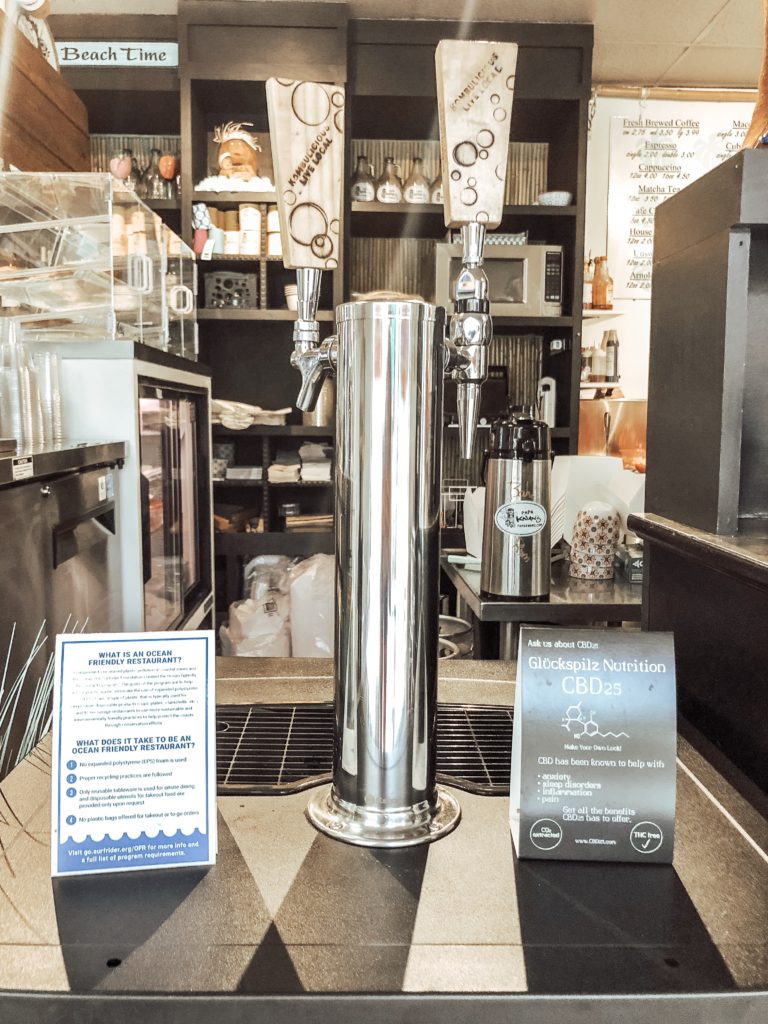
Kombucha is HOT right now. It’s the trendiest drink on the market and after asking the 5 people in my nearest proximity while writing this post, 0% of people know exactly what it is they’re drinking. Which is why I’m taking the time to break down the truth about the drink. My source? A well-researched Kombucha shop owner out of Juno Beach, Florida. He has a store called “Papa Kwans” with all organic Kombucha flavors on tap ranging from CBD to Triple Berry to Apple Cinnamon, and more (if you’re in the area, I HIGHLY recommend). Joel and I had a sit-down and he broke down 5 things I really did not know about Kombucha and I’m guessing you probably didn’t either.

5 things you probably didn’t know about Kombucha:
Q1: What Is Kombucha Made of?
A: Kombucha is a fermented tea, in short. It’s made by adding specific strains of bacteria, yeast, and sugar to black or green tea. Then, it ferments for a week or more. During this process, bacteria and yeast form a mushroom-like film on the surface of the liquid. This “blob” on top of the Kombucha is called a SCOBY – it’s a living symbiotic colony of bacteria and yeast. Scoby is used to ferment the Kombucha.
Q2: Where Did Kombucha Originate From?
A: Kombucha is thought to originate in China or Japan as early as the B.C period — it’s an ancient practice. Since then, it’s been used as a treatment for stomach issues and sweet treat. Kombucha hit the market in mass distribution in the early 2000’s as we became more aware of gut health and the healthy gut-saving bacteria in the drink. Like we Americans do, we over products and added a shoot ton of sugar to the drink. We’ve got to get back to the way this was traditionally made. Cut the crap!
Q3: What’re the Main Health Benefits of Kombucha:
A: The fermentation process in Kombucha brewing produces acetic acid (also found in vinegar) and several other acidic compounds, trace elements of alcohol and gases that make it carbonated. A large amount of probiotic bacteria is produced during fermentation; helping with digestion, inflammation, and even weightloss [see more on gut health]. Kombucha is also filled with disease fighting antioxidants and can kill bacteria. Also, a healthful Kombucha is rich in B-vitamins and K vitamins; both of which are common deficiencies in the American diet. For this reason, it’s energy boosting!
Q4: What’re the Key Things to Look For When Buying Kombucha?
A: Papa Kwan’s owner indicated that Kombucha should be sourced from all organic ingredients with no added sugars. My biggest tout against daily Kombucha is that it has a lot of added sugars – at least the ones on grocery store shelves. Look for organic options with no added sugars and if you can find locally brewed Kombucha that is best. Why? Huge distributors of Kombucha have to pasteurize their product so that it doesn’t go rancid in warm temperatures during transportation. Pasteurization as I’m sure most of you know is the process of “KILLING BACTERIA.” When Kombucha has been pasteurized, it has been rid of all of the healthy gut bacteria which motivated you to pick up that drink in the first place. What are you left with? Basically, Kool Aid.

You Asked, I Answered
I surveyed my Instagram followers and asked if there were any questions regarding Kombucha. Here’s what you asked:
How Often Can I Drink Kombucha?
Kombucha won’t hurt you in over-consumption. However, the key thing to watch out for is the sugar. A normal grocery store Kombucha can rack up 12 grams of sugar per serving. Not to mention, a bottle is 2 servings. I recommend finding a low sugar Kombucha and drinking a small glass every morning to help kick the day off with a digestive aid.
Why Does It Taste So Bad?
Aunt Lisa… Mom… I can’t help you there! HA HA. I will say that bitter is an acquired taste. Taking small amounts frequently can help develop a pallet for the stuff and you may just find you like it. That’s what happened to me and now I seek out bitter flavors!
Trying to Lose Weight/Watch Calories. Should I Drink Kombucha?
Again, I return to the SUGAR issue here. If you’re trying to lose weight the first thing you should do is cut the sugar. Unless you can find a low sugar, local Kombucha brewer for your daily dose, I would not drink store bought Kombucha if you’re trying to lose weight.
The caveat here is that if you can find high quality, low sugar, locally brewed organic Kombucha and take a large shot size every morning if could help your gut in a way that improves digestion, nutrient absorption, elimination, and ultimately get your metabolism moving more efficiently which could help you lose weight.
Any local Pittsburgh vendors?
I have been to Red Star Kombucha in Market Square downtown Pittsburgh which brews Kombucha. I have not investigated their sugar content yet but will do so and update this post as soon as I do.
Sources: https://www.healthline.com/nutrition/8-benefits-of-kombucha-tea#section1


